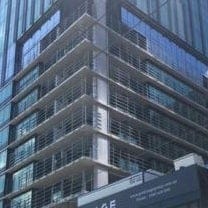Home » Case Studies »
Prevent falls from height

Falls from height continue to cost construction workers’ lives. This Melbourne company uses Australian-made steel and Australian fabrication in its patented 2m-high span screens to protect workers and make construction sites safer.
Despite overall improvements in the incidence rate of serious workers’ compensation claims in the construction industry, falls from height remains the biggest cause of fatalities in the industry. According to Safe Work Australia’s 2015 Construction Industry Profile, 117 construction workers lost their lives at work over the 12-year period between 2002-03 and 2013-14 as a result of a fall from height. It was a first-hand experience with just such a workplace accident that prompted the development of the Shark Screens safety barrier system in 2010.
“My colleague’s son was on his first day’s work as a construction site foreman when he witnessed the death of a co-worker who fell over a low handrail on a site. It came as a big shock. The barriers were only 1100mm high,” says Shark Screens General Manager Damian Lenzi.
All safety screens used on Australian construction sites must meet the requirements mandated by AS/NZS 4994.1:2009. However, Lenzi claims many screens fail to meet the stipulations of the Standard. He tells us that screens that are too low, inadequately affixed, or of substandard materials or doubtful quality fabrication and durability of welds, are commonplace. He says he has also come across many instances where scaffolding has been used as a substitute for a dedicated safety screen solution, putting construction workers at risk.
“A lot of people are using tubular scaffolding as a safety barrier, but this isn’t designed for impact, it’s only designed for downward pressure,” Lenzi says. “As a safety barrier, it doesn’t comply with the relevant Australian Standard.”
We use Australian steel for Australian worker’s safety.
Damian Lenzi, Shark Screens
Australian designed and manufactured using Australian steel
Shark Screens is an Australian-owned business that holds the patent for 2m-high span safety screens for live edge protection on construction sites. Development engineering and securing the patent took the firm approximately 8–10 months. The screens are fabricated in Australia entirely from Australian steel, the main components of which are constructed from Duraprimed steel tube sections supplied by Austube Mills.
Lenzi says the combination of Australian design, Australian fabrication and Australian steel gives users an unsurpassed level of confidence in the protection Shark Screens provides. While he concedes there are cheaper systems available on the market, he cautions that these may not be made to the Australian Standard.
The Shark Screens system is simple to install, can be installed by a third-class labourer, and is reusable, keeping the installation and usage costs down.
“Shark Screens are rated to a 2.7-tonne impact rating,” Lenzi says. “We’ve had two Australian engineers independently test the screens – both have said our screens exceed the requirements of the Australian Standard. We use Australian steel for Australian worker’s safety.”
Michael Bangit, Austube Mills Sales Manager – Vic/Tas, explains that Shark Screens turned to Austube Mills for advice on steel tube compliance and identifying appropriate testing facilities and structural engineers to undertake the required testing to meet the Australian Standard.
“The fabricator of Shark Screens, Genis Steel, sought guidance from Austube Mills’ engineers on how best to test Shark Screens’ products to AS 4994.1:2009 so that they meet all the specifications,” Bangit says. “Our engineers are very thorough and worked hard, often working after hours to ensure the screens met the testing requirements of AS4994.1:2009.”
Construction industry safety record improving
In its 2015 Construction Industry Profile [https://www.safeworkaustralia.gov.au/system/files/documents/1702/construction-industry-profile.pdf], Safe Work Australia reported that “There have been significant reductions in the numbers and rates of injuries and fatalities in this industry over the last ten years or more. Nevertheless, the construction industry remains a high-risk industry.”
The report states that in 2013–14 the construction industry accounted for 9 per cent of the workforce but 12 per cent of all work-related fatalities. While the incidence rate of serious claims in the industry has fallen 31 per cent from 27.5 claims per 1000 employees in 2001–02 to 17.5 in 2011–12, this rate remains higher than the rate for all industries (12.0) and was the fourth highest of all industries in 2011–12.
The Australian Work Health and Safety Strategy 2012–2022 has identified the construction industry as a priority due to the high number and rate of work-related fatalities and serious injuries. The Strategy aims to reduce the incidence of serious injury by at least 30 per cent nationwide by 2022, and reduce the number of work-related fatalities due to injury by at least 20 per cent.
Investment in improved safety in construction is delivering significant results. Safe Work Australia’s Work-related Traumatic Injury Fatalities, Australia 2016 report shows a reduction of 19 per cent in construction industry fatalities in 2016. Falls from height remains the most common cause of fatalities.
Nevertheless, as Safe Work Australia states, the significant economic costs of work-related injury, illness and death are borne by workers, their families, the broader community and employers. Shark Screens’ Lenzi contends that, thanks to the use of quality and compliant Australian-made steel and the Australian manufacture of his company’s patented edge protection screens, there has been no fall-from-height incident involving the death or serious injury of workers on sites employing Shark Screens since the company’s inception.